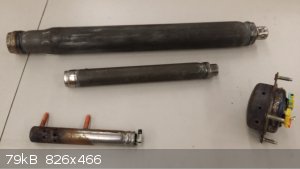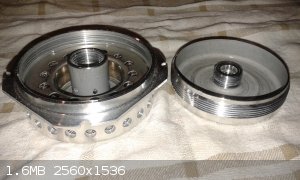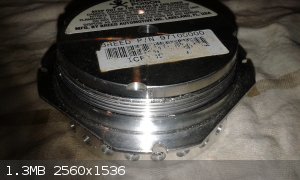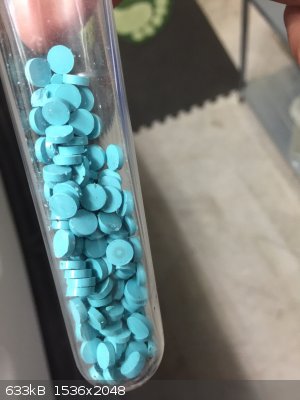spirocycle
Hazard to Others
  
Posts: 197
Registered: 29-9-2010
Member Is Offline
Mood: No Mood
|
|
air bag disassembly
I recently acquired the chemical compartment of an airbag (NaN3 and KNO3)
does anybody know how I can actually get the chemicals out of the housing?
|
|
|
peach
Bon Vivant
    
Posts: 1428
Registered: 14-11-2008
Member Is Offline
Mood: No Mood
|
|

This reminded me of my neighbour.
His wife was complaining about him for spending weeks messing around with the car indicator because he was worried he was going to set the air bag off
in trying to take the steering wheel apart.
As I'm aware of things, the gas generators inside the air bags is not always the same. They've swapped the technologies around a bit and different
people use different methods. Some of them are simply compressed gas.
The older ones are azide based. With the azide being toxic and so fond of exploding, taking them apart is obviously potentially risky business. There is some information here, on the CDC's site. One particularly important point is it forming hydrazoic acid on contact with other materials.
To be honest, I've never heard of someone actually managing to get the containers apart at home.
I know that they're removed from cars before crushing in a lot of places to reduce the toxic content of the scrap.
First up, determine it is actually an azide generator.
I expect to open the azide canister it's self, you would then want to ensure the ignitor was entirely safe.
Drilling it, using harsh sawing or any form of grinder is going to be capable of reaching the 300C point at which it explodes. Similarly, you probably
want to avoid it coming into contact with unknown metals if possible.
The canisters have holes in them to let the nitrogen out. Rather than trying to drill into canister any more, or tear it open, and risk it going off,
you may want to consider dissolving the the azide and recovering it that way.
There are some pictures of the burns these can give even when operating normally here. Do take care shipmate!
{edit}Here you go, someone's already asked about it and another member has managed it. I'd highly recommend PM'ing Nick F to ask him for some (hopefully
hands still on) advice - a photograph of the one you have will likely help.
[Edited on 5-2-2011 by peach]
|
|
|
bquirky
Hazard to Others
  
Posts: 316
Registered: 22-10-2008
Location: Perth Western Australia
Member Is Offline
Mood: No Mood
|
|
search on youtube for Airbag Couch for some Hilarius viewing 
|
|
|
rugbypro5
Harmless

Posts: 2
Registered: 23-4-2015
Member Is Offline
Mood: No Mood
|
|
Airbag taken apart
Hi everyone,
Not sure if anyone's still interested, but I managed to open an undeployed airbag. I mean I got through EVERYTHING. I too was going after sodium azide
for an engineering invention, but I didn't find what I needed. I took casing after casing off until I got to the very center metal casing, in which I
was expecting to find a glorious white chemical, but I only found a black discs of some other chemical.
Please reply or email me if you 1) Are still interested and want pictures+procedures 2) Can help me identify what I found in there.
My email is rugby.mclean@gmail.com and I'll be able to respond to that faster.
Daniel
[Edited on 24-4-2015 by rugbypro5]
|
|
|
rugbypro5
Harmless

Posts: 2
Registered: 23-4-2015
Member Is Offline
Mood: No Mood
|
|
Airbag taken apart
Hi everyone,
I managed to open an un-deployed airbag. I mean I got through EVERYTHING. I was going after sodium azide for an engineering invention, but I didn't
find what I needed. I took casing after casing off until I got to the very center metal casing, in which I was expecting to find a glorious white
chemical, but I only found a black discs of some other chemical.
Please reply or email me if you 1) Are interested and want pictures/procedures 2) Can help me identify what I found in there.
Daniel
|
|
|
Bert
Super Administrator
        
Posts: 2821
Registered: 12-3-2004
Member Is Offline
Mood: " I think we are all going to die. I think that love is an illusion. We are flawed, my darling".
|
|
You did all that hard work to access the propellant without first looking into the likely mixture?!
Pressed discs or pellets of mixed Sodium azide, Potassium nitrate, Silicon dioxide and possibly some Iron oxide.'
Rapopart’s Rules for critical commentary:
1. Attempt to re-express your target’s position so clearly, vividly and fairly that your target says: “Thanks, I wish I’d thought of putting it
that way.”
2. List any points of agreement (especially if they are not matters of general or widespread agreement).
3. Mention anything you have learned from your target.
4. Only then are you permitted to say so much as a word of rebuttal or criticism.
Anatol Rapoport was a Russian-born American mathematical psychologist (1911-2007).
|
|
|
CuReUS
National Hazard
   
Posts: 928
Registered: 9-9-2014
Member Is Offline
Mood: No Mood
|
|
| Quote: | | Also, as I am learning from the news, many air bags now use other chemicals to inflate, including tetrazole, ammonium nitrate, and others, so be
careful mixing with acid until you confirm what the material in the airbag inflator actually is. |
http://www.sciencemadness.org/talk/viewthread.php?tid=36817#...
|
|
|
TGT
Harmless

Posts: 46
Registered: 9-11-2014
Member Is Offline
Mood: No Mood
|
|
Rugbypro5, I would be very interested in seeing pictures if possible. I too will be attempting the same. The airbag I acquired if from a 1997 Lumina
sedan, and I know they use sodium azide. any help would be greatly appreciated. thanks in advance!
tgt
|
|
|
Bert
|
Threads Merged
24-4-2015 at 04:41 |
Bert
Super Administrator
        
Posts: 2821
Registered: 12-3-2004
Member Is Offline
Mood: " I think we are all going to die. I think that love is an illusion. We are flawed, my darling".
|
|
It is fairly dangerous to disassemble an airbag inflator (and a lot of work).
Perhaps you should do a search on "Sodium azide from OTC", there are threads here on this-
Rapopart’s Rules for critical commentary:
1. Attempt to re-express your target’s position so clearly, vividly and fairly that your target says: “Thanks, I wish I’d thought of putting it
that way.”
2. List any points of agreement (especially if they are not matters of general or widespread agreement).
3. Mention anything you have learned from your target.
4. Only then are you permitted to say so much as a word of rebuttal or criticism.
Anatol Rapoport was a Russian-born American mathematical psychologist (1911-2007).
|
|
|
Praxichys
International Hazard
    
Posts: 1063
Registered: 31-7-2013
Location: Detroit, Michigan, USA
Member Is Offline
Mood: Coprecipitated
|
|
Hey guys -
I design airbags for a living. The company I work for hasn't used azide inflators for 7 or 8 years. We are a major supplier of inflators to many other
airbag companies, with one of the only propellant development facilities in the world. We split from Morton Thiokol in the 90s and still share a
facility in Promontory, UT.
There are two types of inflators used these days: hybrid and pyro.
Pyro inflators generate all of their gas from a solid fuel. They burn hot and are mostly used for driver, passenger, knee, and seat side airbags.
Hybrid inflators contain a small amount of propellant inside a vessel of stored inert gas, usually a mixture of helium and argon, which has
been pressurized to generally between 7000 and 9000 PSI. The small amount of propellant creates a shock wave in the gas which breaks a burst
disk and lets the gas out. This type of inflator is usually used in curtain airbags, but can also be found in some driver and passenger bags as well.
We also have versions with oxygen-negative propellants and oxygenated stored gas, usually for high-volume curtains like 4-row vans and trucks with
tall windows.
In both cases, the generant is usually a highly compressed pellet of a mixture of guanidine nitrate, 5-ATZ, and basic copper nitrate, along with some
pentaerythritol for binding and carbon black for anti-static, and some other miscellaneous (and proprietary) bonding agents/burn rate modifiers.
I would not recommend cutting into any airbag inflator without knowing what is inside. There is a news article posted in the cafetria about someone in
the industry who had been taking home unused inflators for amusement, until one of them went flying and crushed his brother-in-law's skull, killing
him. I believe he is in prison for involuntary manslaughter.

The long ones on top are live hybrids, the bottom left is a spent pyro for a seat side airbag and the bottom left is for a driver airbag. For
reference, the big one at the top is 340mm in length.
[Edited on 24-4-2015 by Praxichys]
|
|
|
Bert
Super Administrator
        
Posts: 2821
Registered: 12-3-2004
Member Is Offline
Mood: " I think we are all going to die. I think that love is an illusion. We are flawed, my darling".
|
|
I have reasonably good hand tool skills, took various engineering related classes, have been several kinds of technician and installer. Can use a
metal lathe, milling machines, precision grinders and most common welding and metalworking tools. So opening an airbag unit should be child's play to
me!
About 15-20 years back, I disassembled 3 azide type airbags. 2 successfully. The 3rd, I was VERY lucky and only lost some of my beard and hair, got a
1st degree burn on one side of my forehead that resembled a bad sunburn, did not blister or scar. I needed a haircut and had to do some fast talking
to a neighbor who heard (and smelled) the accident.
If the device had been oriented a little differently, I could have been seriously injured.
I quit scavenging Sodium azide and learned more about chemistry after that... Suggest the same for you.
Rapopart’s Rules for critical commentary:
1. Attempt to re-express your target’s position so clearly, vividly and fairly that your target says: “Thanks, I wish I’d thought of putting it
that way.”
2. List any points of agreement (especially if they are not matters of general or widespread agreement).
3. Mention anything you have learned from your target.
4. Only then are you permitted to say so much as a word of rebuttal or criticism.
Anatol Rapoport was a Russian-born American mathematical psychologist (1911-2007).
|
|
|
Praxichys
International Hazard
    
Posts: 1063
Registered: 31-7-2013
Location: Detroit, Michigan, USA
Member Is Offline
Mood: Coprecipitated
|
|
If I was to invent a procedure for removing the azide, I think it would involve first finding out where everything is at inside the inflator, maybe by
deploying it and cutting it in half. Then, drill into the casing of another to get to the propellant, and dissolve it out with an acetone/water
solution (water to dissolve the azide, acetone to get rid of any waterproof coating, etc.), kind of like solution mining. Just be careful - azide has
lethal doses in the tens of mg/kg, nearly as toxic as cyanide.
Anyway, definitely do not try to cut into a hybrid inflator. It is the equivalent to cutting into a SCUBA tank, except the tank is thinner,
heat-treated, and the static gas pressure is about three times higher. I have seen prototypes fail during mechanical stress testing, getting
peeled open like sardine cans just from the inert gas. Our test chambers are bulletproof for a reason. Hybrids are too new to have azide in them
anyway - just be sure you can tell the difference before you pull out the hacksaw.
I should also mention that when we destroy unused inflators, the standard procedure is to place a ton or so at a time into a giant wire basket and put
the basket into a big kiln. They simply cook off and are sold as steel scrap. Makes me sad... I could make a hell of a cannon out of some of those!
|
|
|
nux vomica
Hazard to Others
  
Posts: 267
Registered: 18-7-2013
Member Is Offline
Mood: No Mood
|
|
Hi I recently disassembled a 1997 ford drivers airbag don't have pics of the pellet canister but it was made from tinplate glued together you get 50
grams of pellets that I get 1 gram LA per gram of pellets
if you think about it a airbag has to take a lot of punishment with road vibrations and constantly being turned so as long as you're not stupid you
will be ok
 
[Edited on 26-4-2015 by nux vomica]
|
|
|
NeonPulse
Hazard to Others
  
Posts: 417
Registered: 29-6-2013
Location: The other end of the internet.
Member Is Offline
Mood: Isolated from Reality! For Real this time....
|
|
Quote: Originally posted by Praxichys  | Hey guys -
I design airbags for a living. The company I work for hasn't used azide inflators for 7 or 8 years. We are a major supplier of inflators to many other
airbag companies, with one of the only propellant development facilities in the world. We split from Morton Thiokol in the 90s and still share a
facility in Promontory, UT.
There are two types of inflators used these days: hybrid and pyro.
Pyro inflators generate all of their gas from a solid fuel. They burn hot and are mostly used for driver, passenger, knee, and seat side airbags.
Hybrid inflators contain a small amount of propellant inside a vessel of stored inert gas, usually a mixture of helium and argon, which has
been pressurized to generally between 7000 and 9000 PSI. The small amount of propellant creates a shock wave in the gas which breaks a burst
disk and lets the gas out. This type of inflator is usually used in curtain airbags, but can also be found in some driver and passenger bags as well.
We also have versions with oxygen-negative propellants and oxygenated stored gas, usually for high-volume curtains like 4-row vans and trucks with
tall windows.
In both cases, the generant is usually a highly compressed pellet of a mixture of guanidine nitrate, 5-ATZ, and basic copper nitrate, along with some
pentaerythritol for binding and carbon black for anti-static, and some other miscellaneous (and proprietary) bonding agents/burn rate modifiers.
I would not recommend cutting into any airbag inflator without knowing what is inside. There is a news article posted in the cafetria about someone in
the industry who had been taking home unused inflators for amusement, until one of them went flying and crushed his brother-in-law's skull, killing
him. I believe he is in prison for involuntary manslaughter.
The long ones on top are live hybrids, the bottom left is a spent pyro for a seat side airbag and the bottom left is for a driver airbag. For
reference, the big one at the top is 340mm in length.
[Edited on 24-4-2015 by Praxichys]
I know I posted this elsewhere on SM but I didn't know this thread was here else I would have posted this question here first. Could these green discs
the guanidine nitrate copper nitrate combo? Or could they be something else? They were in two seperate containers, one was the main compartment with
about 35g and the other was in a smaller compartment around an initiator,with 10g next to yet another smaller compartment containing boron potassium
nitrate and another initiator. This was from a 2003 ford. I was just curious since I know I lucked out in getting NaN3 and wondered what else this
could be.
 |
|
|
|
unionised
International Hazard
    
Posts: 5129
Registered: 1-11-2003
Location: UK
Member Is Offline
Mood: No Mood
|
|
Let me just check.
That blue stuff is a pyrotechnic mixture designed to produce a lot of hot gas in a hurry.
And you thought that a glass container was a good choice?
http://en.wikipedia.org/wiki/Shrapnel_shell
|
|
|
Praxichys
International Hazard
    
Posts: 1063
Registered: 31-7-2013
Location: Detroit, Michigan, USA
Member Is Offline
Mood: Coprecipitated
|
|
@ NeonPulse -
Those look very much like the guanidine nitrate/BCN tablets. What was the model of vehicle, and which airbag did it come out of? The odds that my
company made it are pretty high. I might be able to find out for sure.
The dual initiator setup is common in modern DAB/PABs. It is designed to control gas output to better match the severity of a crash. The crash control
computer will fire either one or both based on several sensor inputs.
[Edited on 4-5-2015 by Praxichys]
|
|
|
NeonPulse
Hazard to Others
  
Posts: 417
Registered: 29-6-2013
Location: The other end of the internet.
Member Is Offline
Mood: Isolated from Reality! For Real this time....
|
|
Pretty obvious that it's a pyrotechnic mixture considering its origin.since there is a person who knows quite a bit about airbags and their
manufacturing I thought I'd ask.
Thanks for your concern but this is a plastic test tube.
Praxychs, it was the drivers side unit from a 2003 BA Ford falcon. Thanks for your help in clearing that up for me.
[Edited on 5-5-2015 by NeonPulse]
|
|
|